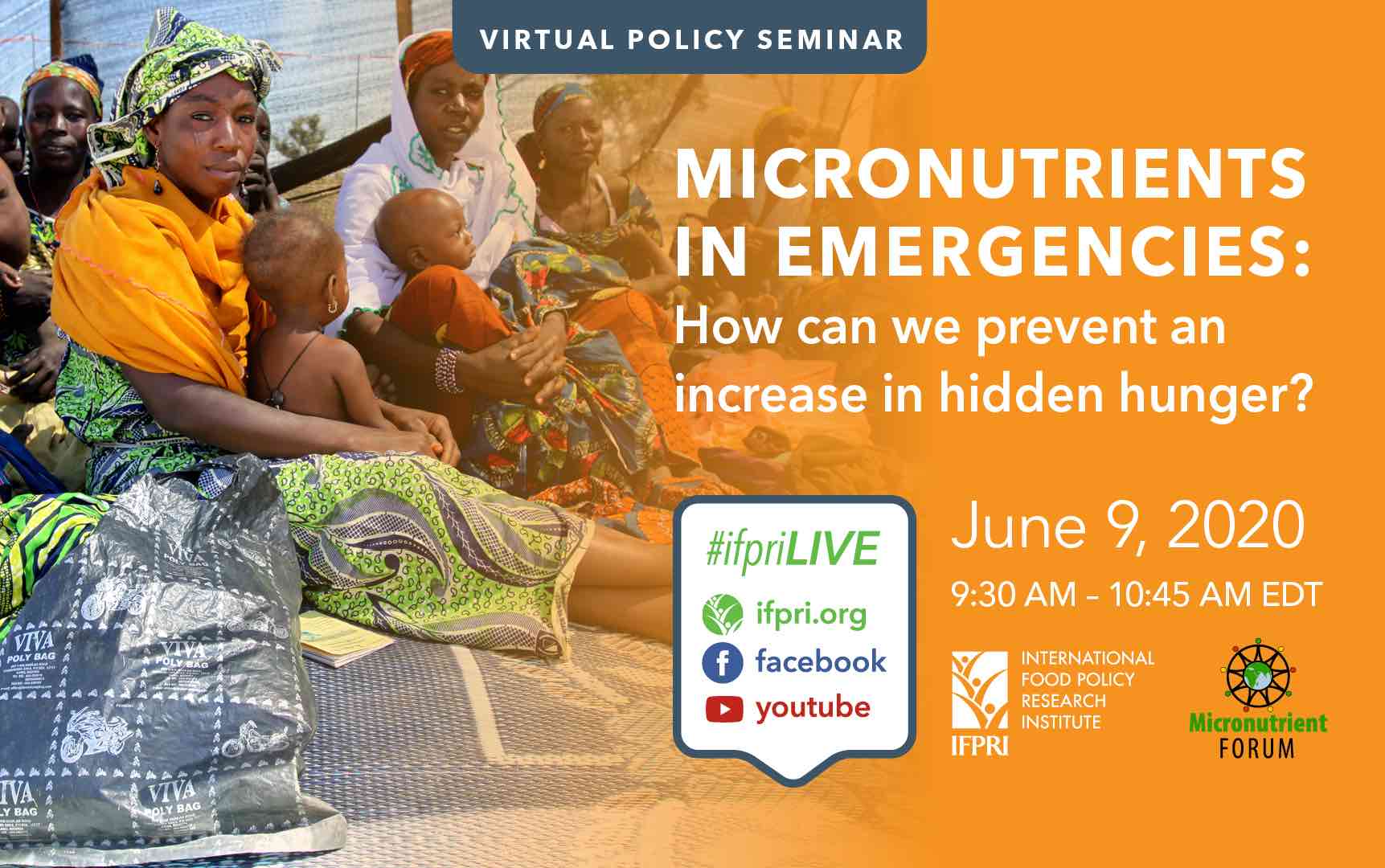The COVID-19 pandemic and associated business shutdowns and other control measures threaten to increase global poverty and along with it, food insecurity—including micronutrient deficiency and associated diseases. A June 9 virtual policy seminar, co-hosted by IFPRI and the Micronutrient Forum, examined what actions are needed to prevent an increase in micronutrient malnutrition, also called hidden hunger.
“If we are not careful, the COVID-19 crisis will set us back several years in our efforts to eliminate micronutrient malnutrition. But it doesn’t have to,” said Micronutrient Forum Executive Director Saskia Osendarp.
The pandemic puts recent gains at risk. Hidden hunger is closely related to GDP; during an economic crisis, it is the first type of malnutrition to appear, as more expensive, nutritious foods are the first to be dropped from household menus.
“Progress has been made in reducing all forms of malnutrition, including micronutrient malnutrition,” said John McDermott, Director of the IFPRI-led CGIAR Research Program on Agriculture for Nutrition and Health (A4NH). “There is increased sophistication in how we address malnutrition, but COVID-19 has shown us the fragility of food systems around the world. Our work is to ensure we protect food systems and good nutrition.”
Osendarp shared the work of nutrition and food systems professionals on a conceptual framework of how COVID-19 is impacting malnutrition. The disruptions of economic, food and health systems are increasing food insecurity, poverty, and inequality, reducing access to nutritious foods and nutrition-specific health interventions, and pushing back progress made in areas such as women’s empowerment and hygiene. These in turn affect diet quality and health, leading to increases in all forms of malnutrition.
How can rises in micronutrient malnutrition be prevented, now and during other crises? Social protection programs can play an important role, according to Dan Gilligan, Deputy Director of IFPRI’s Poverty, Health, and Nutrition Division. They can increase incomes and thus help to improve dietary diversity; the infrastructure is often already in place and so can be easily expanded; and research shows they work, Gilligan said. A fortified school meals program in Ugandan camps for internally displaced people was found to reduce anemia prevalence in adolescent girls, in adult women in take-home rations, and in infants and young children, he noted.
Integrating food fortification into social safety nets is also essential to prevent a rise in hidden hunger, said Penjani Mkambula, Global Program Lead for Food Fortification at the Global Alliance for Improved Nutrition (GAIN).
Fortifying readily available staple foods helps address nutrient intakes across the general population, Mkambula said. Maintaining and expanding fortification programs, including those that are part of social programs, is one point of Mkambula’s four-point plan to double down on fortification during the pandemic. The other three points are building resilience by fixing supply chain vulnerabilities; addressing trade barriers; and coordinating, managing, and providing technical assistance online. “This is not the time to pause fortification,” said Mkambula. “Countries, companies, purchasers need to keep fortifying so we can prevent an increase in micronutrient deficiencies.”
Providing micronutrient supplements has long been an important strategy to address hidden hunger, particularly in vulnerable populations with substantial nutritional needs.
“In emergencies, supplementation plays a critical role in treating disease outbreak, preventing an increase in micronutrient deficiency and preventing further morbidity and mortality,” said Nita Dalmiya. a maternal nutrition specialist with UNICEF, which leads many of the world’s supplementation programs.
UNICEF has recently experienced disruptions in services due to pandemic mitigation measures, Dalmiya said. She shared some of the organization’s experiences from other emergencies, including a Nutrition Action Week in Bangladesh’s Cox Bazaar during the Rohigya refugee crisis. Children received vitamin A supplementation, deworming, screening of acute malnutrition, and nutrition counseling with sustained high coverage. UNICEF and its partners have issued important guidance on how to continue supplementation programs during COVID-19 response.
The COVID-19 crisis poses significant challenges on food systems and health systems that threaten micronutrient nutrition, participants acknowledged. But they agreed that by pursuing a range of responses such as social protection interventions, fortification, biofortification, and supplementation, the world can prevent an increase in hidden hunger in this difficult moment.
Aynsley Morris is Global Conference Manager and Global Communications Lead with the Micronutrient Forum.







